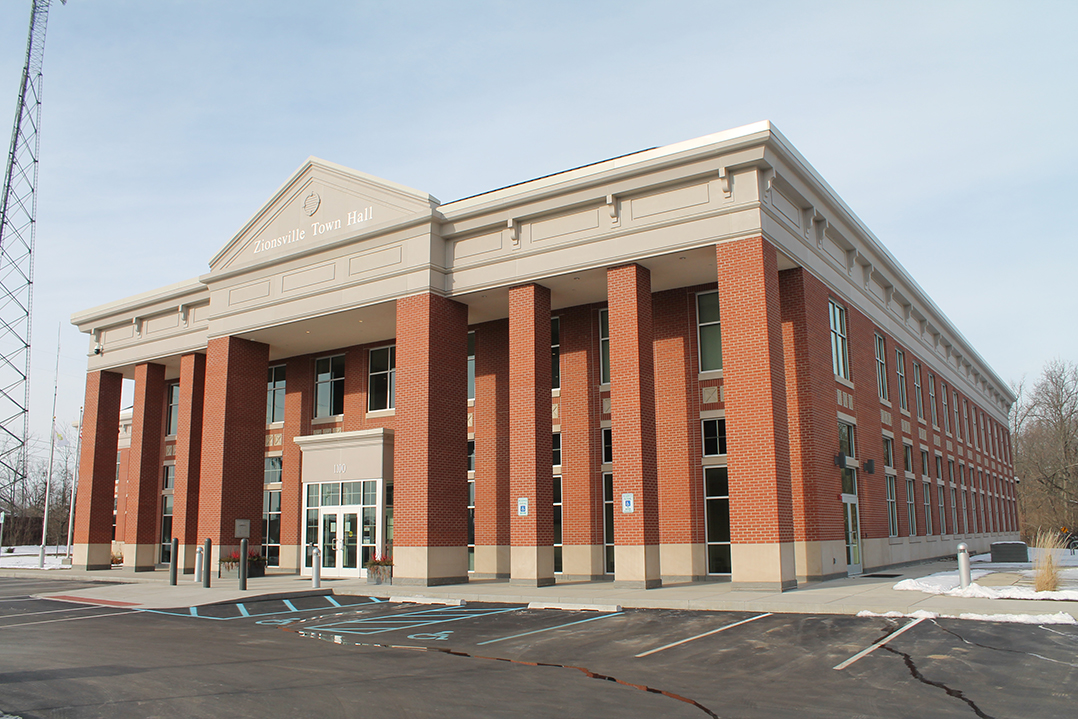
The latest drama between the Zionsville Town Council and Zionsville Mayor Emily Styron unfolded during a Dec. 6 council meeting when council member Bryan Traylor accused Styron of “going around the council” to fund the town’s Municipal Action Center.

“There’s no trust there,” Traylor said during the meeting of his and other council member’s relationships with Styron. “(The mayor’s administration) spent $204,000 out of (the Town Hall Improvement Fund) that the council didn’t have transparency to, and the mayor specifically asked for an appropriation for that money. We, as a council said, no. She went instead out of this account that you guys aren’t disclosing to us. It’s (expletive). It’s flat-out (expletive). We were very transparent. We didn’t want to spend that money.”
After meeting with legal counsel Dec. 14, Traylor said he and two other council members and the council’s attorney, Heather Harris, were confident the mayor’s administration operated outside of state statute when it drew money from the Town Hall Improvement Fund and Motor Vehicle Fund to pay for the Municipal Action Center — money Traylor said the council did not budget for or appropriate funds out of in 2021.
“Right now, it’s the process of trying to figure out if she’s allowed to do what she’s done,” Traylor said after the meeting.
But Styron believes she acted within her authority to use the money from the funds to pay for the project in a “public and transparent” way.
“Everything that we did in terms of the additional appropriation request was provided during a public meeting,” Styron said after the meeting. “And all of the related expenses were reviewed and voted on by the town council in their bimonthly claims package. Every dollar that was spent on the MAC went before the council after the fact, where they reviewed the claim package, and they all voted individually. And all of the project abided by all state statutes related to public bidding.
“Due to how the fund was established, it is unappropriated. Cash available can be used for the specified purpose of the fund. That is how it was used in the past. Councilor Traylor has insisted this process has not been transparent, but this is simply not true.”
During the meeting, Traylor cited concerns about how the mayor funded the town’s Municipal Action Center, which opened in late October on the first floor of Town Hall. Council members raised concerns that the fund did not appear on the town’s Dept. of Local Government Finance budget or non-DLGF budget.
The Dept. of Local Government Finance only reviews tax-supported funds, and the town has funds that are not reviewed by the DLGF, which are accounted for in a separate, non-DLGF budget. Council members say the Town Hall Improvement Fund is a non-DLGF fund, but it was not included in the mayor’s Dec. 6 presentation of the town’s 2022 non-DLGF budget. Zionsville CFO Tammy Harvard said the Town Hall Improvement Fund was not included in the non-DLGF budget because it has a balance of zero dollars. Council members accused the mayor’s administration of completely exhausting the fund without their knowledge or approval to pay for the Municipal Action Center.
“Even though it didn’t show up in the budget, they kept it off in this third budget, which was just random funds that they didn’t put into either budget and started pulling money out of it to pay for this Town Hall renovation,” Traylor said. “And the biggest thing is, I get a lot of push-back from people who say, ‘Why don’t you just talk to the mayor?’ Well, the problem is she doesn’t answer us. Getting information from this administration is next to impossible. I post things in social media, in large part, because once I do, I start getting answers from the administration. And it’s sad that it has to be done that way. And when I speak up and say things that are out of line in the town council meetings, it gets her attention, and I start getting answers.”
During her first year in office, Styron envisioned the center as a one-stop shop for residents and officials to conduct government business. Plans for the center were incorporated into the Town Hall reconfiguration earlier this year and was a point of contention between Styron and some town council members. The council voted 4-3 against two additional appropriations for the reconfiguration, with the majority voicing budgetary concerns and a reluctance to remodel the first floor of a building that opened less than five years ago. The additional appropriations were suggested to come out of the town’s CCI and CCD funds.
Havard said during a council meeting earlier this year that the town planned to finance the reconfiguration regardless of the council’s vote concerning additional appropriations. The mayor and many town officials favored the reconfiguration because it was expected to save the town money by relocating two departments into Town Hall. Town officials said the additional appropriations were primarily for furnishing and other supplementary expenditures that were not crucial to construction.
But in the past year, council members have expressed frustration with the town’s switch to a new financial system, which they say impedes their ability to see town cash balances and expenditures. They said they were not able to see specifics as to how the Town Hall Improvement Fund money was spent until they reached the council’s claims process, which is typically a formality at the end of council meetings when council members approve claims for vendor services already rendered. Council members say if they were to not approve claims by that point, vendors would not be paid for completed services. Traylor said it leaves council members no choice but to approve the claims.
“(At best), we’ll have late fees,” Traylor said. “At worst, we’ll get sued. But I learned a valuable lesson there. I won’t be as easy going on claims going forward because we were definitely taken advantage of, in my opinion.”
The switch to a new financial system also delayed monthly financial reports to the council for most of the last year. According to Zionsville Town Council President Josh Garrett, council members didn’t receive January 2021 through June 2021 financial information until September. He said that because the previous financial system was turned off in 2020, the town council could not see comprehensive financials — including total revenue, total expenses and cash balances from the second half of 2020 through June 30, 2021 — until Sept. 23.
“What we had been asking for all along was, ‘Where are you coming up with this money?’ But without those monthly financials, it was really hard for us to follow along,” Traylor said. “We were kind of at a disadvantage there.”
Harvard said the council will receive financials monthly now that the new financial system is operational. The financials the council received in September included information regarding the Town Hall Improvement Fund. Traylor said the council, because it did not have financial reports to reference, was unaware of the cash balance in the fund until Sept. 23 and did not know the fund had no budgeted expenses in 2021 when Havard told the council the mayor planned to tap the fund to pay for the project, regardless of the council’s vote concerning the additional appropriations in March.
Harris confirmed the council needed more transparency from the administration.
“The role of this body is to be the fiscal oversight agent for the town, so if there is not transparency with the public body that is overseeing the funds for the town — even if you are just saying this is dedicated and can only be used for this source, or this is how these funds will be spent — there still needs to be some public accounting, given not only to the town council but to members of the general public,” Harris told the council during the meeting. “And we have seen this a couple of different times, and I, as your advisor to the town council, would have a lot of discomfort in the fact that you are not seeing all of the funds, and you are not seeing all of the fund balances and you are not seeing how those dollars are spent.”
Council members say future Town Hall building repairs and maintenance will now have to come from the general budget, which they say means reduced dollars for public safety and roads.
Traylor said the council is unsure what its next steps will be after meeting with legal counsel, but he expects state officials will want to investigate the matter further.


